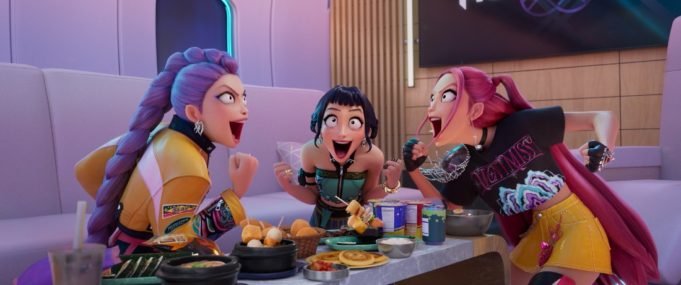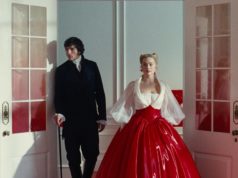I went to my doctor’s office last week for my annual physical, and while they were testing my hearing, I had to tell them that I wasn’t hearing the tones clearly because they were playing “Golden” in the examination room. That’s just one measure of the success of Netflix’s animated film KPop Demon Hunters, where the song is from. How about more? That song has topped the Billboard charts, the movie is still topping Netflix’s own charts two months after it dropped on the streamer, and now it’s coming to theaters this weekend for sing-along screenings.
All this is for good reason. It’s the best animated movie I’ve seen so far this year, which would be enough of a recommendation. But it’s also the first great K-pop musical, one that understands the changing relationship between musicians and their fans in today’s climate. Maybe the weirdest thing is that it wasn’t made by the South Korean entertainment industry, but rather in this country. That helps make this a great primer on the sound that one can fairly say has taken over the pop-music world.
If you have somehow escaped the hype for this, the story takes place in a world where each Korean generation trains a new all-female musical trio that uses their songs to prevent demons from taking over the world, as well as using their skills with weapons to hunt down demons during their down time. Today’s girl group is called Huntr/x (pronounced “huntrix”), and their fans breathlessly fill us in on the three members: Mira (voiced by May Hong), the pink-haired sardonic main dancer and choreographer; Zoey (voiced by Ji-young Yoo), the bubbly American lyricist and rapper; and Rumi (voiced by Arden Cho), the purple-haired one with a tragic past and a powerhouse singing voice. Alas, the demons gain a key bit of leverage over Rumi when they discover that she herself is part demon and concealing that fact from the world.
Clearly, directors and co-writers Maggie Kang and Charles Appelhans (whose Hollywood credits include Puss in Boots and Rise of the Guardians) are steeped in the workings of the K-pop machine that promotes an insane work ethic and releases new music with blinding speed. A demon musician named Jinu (voiced by Ahn Hyo-seop) creates a demonic boy band to compete with Huntr/x on their own turf, and when he first meets Rumi, it’s shot like the opening of one of Netflix’s romantic Korean TV dramas — complete with gauzy visuals and Rumi falling down in slow motion — right up until Jinu brusquely refuses to help her up and tells her to watch out. Jinu’s group The Saja Boys are splendid parodies of Korean boy bands, impossibly hot guys who toss their hair in unison, with one member giving out pictures of his abs in lieu of autographs. We see social-media videos expressing fans’ adoration of the groups, and Rumi only has to make one public appearance with Jinu before fans start shipping them and giving them the couple name “Rujinu.”
The animators at Sony Pictures Animation frequently draw the characters with facial expressions from Japanese anime, but on figures that are animated in 3D, which gives the whole film a different look. When the demons sabotage Huntr/x’s plane, the girls eat their ramyeon really fast like they’re in a mukbang video before the plane crashes. You won’t need a trip to Seoul to get the jokes, though, because the film is also full of simpler gags, like when Jinu’s fearsome lion mascot appears on Rumi’s balcony and then spends an inordinate amount of time trying to put a flowerpot rightside-up after knocking it over.
None of this would matter that much if the songs weren’t good. The ones here (which frequently feature Korean-language lyrics) aren’t just credible as coming from a world-touring group, many of them are incorporated into the fight sequences, like the opening number “How It’s Done,” as the girls sing and rap while slicing and stabbing at demons on their plane. The girls’ diss track “Takedown” is a fleet number where Mira discovers the beat by banging a demon against a wall and The Saja Boys’ earworm “Soda Pop” establishes them as worthy adversaries for Huntr/x. (Fun fact: The word “saja” means “lion” in Korean, and the band’s promotional material is full of lion imagery, but it also means the personification of death when it’s written with a different character.) As well as doing some songwriting, Ejae provides Rumi’s singing voice, with Audrey Nuna and Rei Ami filling out Huntr/x’s vocals, and her singing anchors the film even more than Rumi’s storyline.
That story involves Rumi needing to take the advice in “Golden” and see her ancestry as a strength rather than a weakness. Maybe this part could hold up a little better, but KPop Demon Hunters is so much fun that I’m not inclined to make an issue of it. The movie squeezes big-name talent into small roles (Ken Jeong as Huntr/x’s overwhelmed manager, Yunjin Kim as the band’s mentor, Daniel Dae Kim as a quack doctor, and Lee Byung-hun as the demon king), and the casting feels fun instead of overstuffed. It’s all good enough that if Huntr/x were a real band, I’d at least be checking out prices for their concert tickets. As it is, the sing-along screenings can re-create the atmosphere of a concert on a smaller scale.
KPop Demon Hunters
Voices by Arden Cho, May Hong, Ji-young Yoo, and Ahn Hyo-seop. Directed by Maggie Kang and Charles Appelhans. Written by Danya Jimenez, Hannah McMechan, Maggie Kang, and Chris Appelhans. Rated PG.











